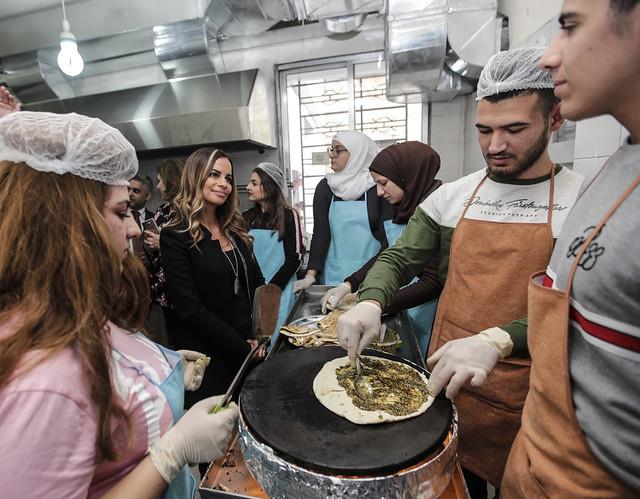FAO’s Special Goodwill Ambassador for Zero Hunger visits resilience building projects in Lebanon

©FAO/Anwar Amro -- Schools students prepare traditional Lebanese pizza “Manouche” in front of FAO Goodwill ambassador Mrs Darine El Khatib.
Beirut, 19 April 2019 - Boosting the resilience of people in conflict areas in the Near East and North Africa, both refugees and hosting communities, is a big challenge.
In Lebanon, Syria's eastern neighbour, more than one million Syrian refugees add to the country's economic and social burdens and affect the sustainability of agriculture, the stability of small-scale farming, and the livelihoods of vulnerable communities.
Two projects managed by the Food and Agriculture Organization of the United Nations (FAO) give some hope, as they support both the Lebanese and Syrian peoples. Darine El Khatib, FAO's Special Goodwill Ambassador for Zero_Hunger for the Near East and North Africa, visited beneficiaries from the two projects during a visit to Lebanon between 17 and 20 April 2019.
Developing agricultural education
On the first day, El Khatib, accompanied by a delegation led by Maurice Saade, FAO representative in Lebanon and other FAO officials in Lebanon and the region, visited an agriculture technical school in Fanar. Supported by FAO and sister organizations, as well as a number of partners from non-profit organizations, the school prepares its students to join the agriculture and food sectors or to continue their higher studies in agriculture and other sustainable development sectors. This school, which graduated many agricultural experts in Lebanon and the world, such as former FAO Director General Edouard Saouma, trained around 1577 students in about 30 months, 62 percent of them girls, and 30 percent of them Syrian refugees.
The school in Fanar and seven other agricultural schools across the country annually enlisted 210 students in the technical secondary certificate program, half of them girls. FAO provided special training for 60 teachers on various issues related to agriculture and its modern technologies. It also brought together partners from the private and public sectors to support the Lebanese Ministry of Agriculture's efforts to manage these schools.
Supporting livelihoods in Akkar
On the second day, El Khatib and the official delegation travelled to Akkar north of the country, touring mountainous areas where FAO, in cooperation with the Lebanese Ministry of Agriculture, supports agricultural livelihoods and job creation through investment in land reclamation and water reservoirs. The FAO project in northern Lebanon boosts the Ministry's Green Project, which helps small-scale farmers improve their income by reclaiming arable land and using better irrigation methods.
The project represents a successful strategy aimed at increasing investments in the host communities while supporting the livelihoods of the refugees. It creates many jobs for unskilled Lebanese and Syrian labourers alike.
By the end of 2018, the Akkar project supported 813 farmers, 21 percent of them women, and created 62,912 temporary jobs, which is equivalent to 55,000 seasonal jobs every year. Some 267.4 hectares of land were reclaimed, and around 30,000 trees were planted. The project also puts 125 cubic meters of irrigation water under the disposal of farmers in those regions.
Seeing benefits for Beneficiaries
El Khatib said she was pleased with the opportunity to visit beneficiaries from FAO projects in Lebanon. "Building the resilience of vulnerable communities goes a long way in fighting hunger and achieving the Second Sustainable Development Goal by 2030," she said. She noted, however, that more efforts are needed given that the world currently has more than 823 million hungry people, largely because of rising conflicts and wars, particularly in the Near East and North Africa.
For his part, FAO Representative in Lebanon Maurice Saada said: "In its efforts to achieve food security, Lebanon is facing urgent challenges, especially with regard to food safety, food loss, and the provision of livelihoods in rural areas." He explained that FAO is supporting 10 projects to achieve sustainability in the agriculture and food sectors in Lebanon and providing assistance and expertise to its partners to address the agriculture and food security challenges the country is now facing. These projects, he said, include support for the Lebanese Ministry of Agriculture's Green Project, where small farmers receive technical and material support to improve their incomes and jobs are created for vulnerable communities in rural areas.
FAO in Lebanon
FAO's assistance in Lebanon focuses on capacity building on disaster risk management, livelihood support, food security, transboundary animal diseases control, restoration of animal production, climate smart agriculture, and natural resource management. In addition to ensuring humanitarian assistance, FAO focuses on the protection of the most vulnerable among displaced Syrians and the poorest among the Lebanese people, enhancing the capacity of the national and local systems to expand access to basic and quality public services. Moreover, FAO promotes environmental and institutional stability of Lebanon by expanding economic and living opportunities that benefit local economies and vulnerable communities.
Darine El Khatib
Darine el Khatib is a Lebanese media professional based in Dubai, United Arab Emirates, and FAO's Special Goodwill Ambassador for Zero Hunger for the Near East and North Africa. Even before joining FAO's effort, el Khatib launched a campaign against hunger on the Middle East's popular Fatafeat TV food channel.
Contact
Mohamed Alaidaroos
Communication and Knowledge Management Officer - Near East and North Africa
+20 1015012892
[email protected]
